Toyota Proace Bus vs VW Touran – Performance, range & efficiency compared
Compare performance, boot capacity, efficiency and price at a glance.
Find out which car is the better choice for you – Toyota Proace Bus or VW Touran?
Costs and Efficiency:
When it comes to price and running costs, the biggest differences usually appear. This is often where you see which car fits your budget better in the long run.
Toyota Proace Bus has a somewhat advantage in terms of price – it starts at 31600 £, while the VW Touran costs 35400 £. That’s a price difference of around 3831 £.
Fuel consumption also shows a difference: VW Touran manages with 5.20 L and is therefore clearly perceptible more efficient than the Toyota Proace Bus with 6.50 L. The difference is about 1.30 L per 100 km.
Engine and Performance:
Power, torque and acceleration say a lot about how a car feels on the road. This is where you see which model delivers more driving dynamics.
When it comes to engine power, the Toyota Proace Bus has a slightly edge – offering 180 HP compared to 150 HP. That’s roughly 30 HP more horsepower.
In acceleration from 0 to 100 km/h, the VW Touran is convincingly quicker – completing the sprint in 8.90 s, while the Toyota Proace Bus takes 13.30 s. That’s about 4.40 s faster.
In terms of top speed, the VW Touran performs to a small extent better – reaching 209 km/h, while the Toyota Proace Bus tops out at 170 km/h. The difference is around 39 km/h.
There’s also a difference in torque: Toyota Proace Bus pulls minimal stronger with 400 Nm compared to 360 Nm. That’s about 40 Nm difference.
Space and Everyday Use:
Cabin size, boot volume and payload all play a role in everyday practicality. Here, comfort and flexibility make the difference.
Seats: Toyota Proace Bus offers clearly more seating capacity – 9 vs 5.
In curb weight, VW Touran is noticeable lighter – 1520 kg compared to 1835 kg. The difference is around 315 kg.
In terms of boot space, the VW Touran offers clearly more room – 834 L compared to 0 L. That’s a difference of about 834 L.
When it comes to payload, Toyota Proace Bus decisively takes the win – 1265 kg compared to 601 kg. That’s a difference of about 664 kg.
Who wins the race?
The VW Touran proves to be wins by a narrow margin and therefore becomes our DriveDuel Champion!
VW Touran is the better all-rounder in this comparison.
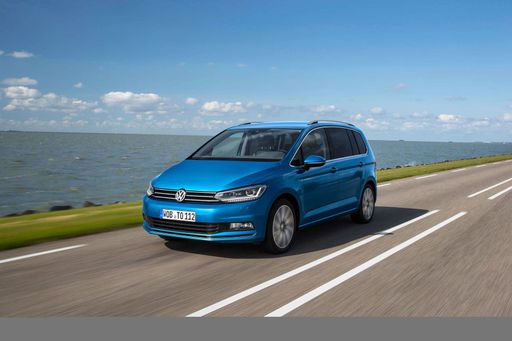 @ Volkswagen AG / VW Media
@ Volkswagen AG / VW Media
VW Touran
Toyota Proace Bus
The Toyota Proace Bus offers a versatile and practical solution for those in need of spacious passenger transport combined with a touch of comfort. Its interior is designed to maximise seating capacity while ensuring that both driver and passengers can enjoy a pleasant journey. With its efficient engine options and reliable build quality, this vehicle remains a popular choice for families and businesses alike.
detailsVW Touran
The VW Touran is a sensible family people‑carrier that mixes practical packaging with tidy, German-built refinement, making everyday life with kids and shopping feel a lot less chaotic. If you want a reliable, no-nonsense companion that drives with surprising poise and values usefulness over flash, the Touran is a very persuasive choice.
details @ Volkswagen AG / VW Media
@ Volkswagen AG / VW Media
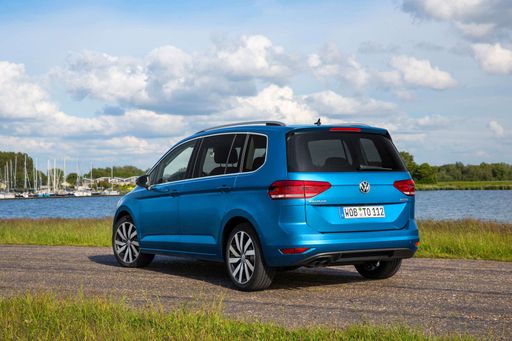 @ Volkswagen AG / VW Media
@ Volkswagen AG / VW Media
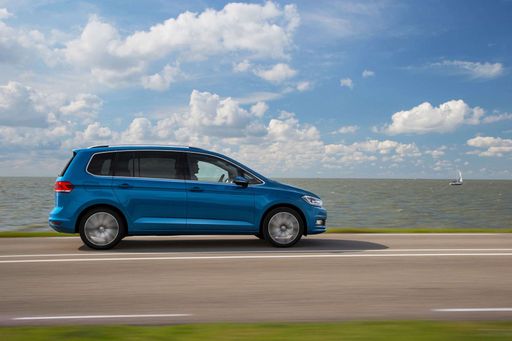 @ Volkswagen AG / VW Media
@ Volkswagen AG / VW Media
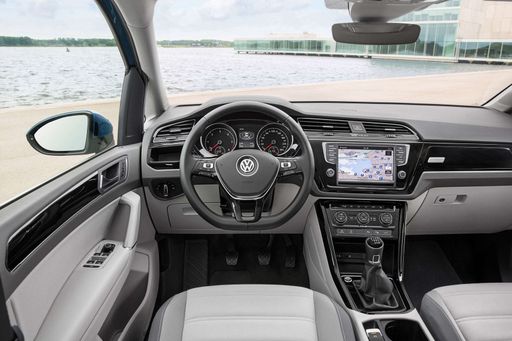 @ Volkswagen AG / VW Media
@ Volkswagen AG / VW Media
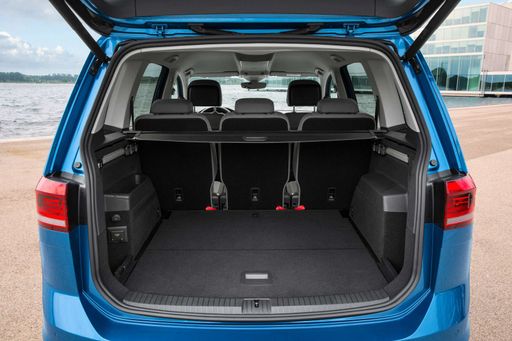 @ Volkswagen AG / VW Media
@ Volkswagen AG / VW Media
 @ Volkswagen AG / VW Media
@ Volkswagen AG / VW Media
|
|
|
|
|
Costs and Consumption |
|
|---|---|
|
Price
31600 - 57100 £
|
Price
35400 - 43900 £
|
|
Consumption L/100km
6.5 - 6.7 L
|
Consumption L/100km
5.2 - 6.5 L
|
|
Consumption kWh/100km
24.2 - 24.4 kWh
|
Consumption kWh/100km
-
|
|
Electric Range
218 - 343 km
|
Electric Range
-
|
|
Battery Capacity
-
|
Battery Capacity
-
|
|
co2
0 - 177 g/km
|
co2
136 - 149 g/km
|
|
Fuel tank capacity
69 L
|
Fuel tank capacity
58 L
|
Dimensions and Body |
|
|---|---|
|
Body Type
Bus
|
Body Type
MPV
|
|
Seats
5 - 9
|
Seats
5
|
|
Doors
4 - 5
|
Doors
5
|
|
Curb weight
1835 - 2140 kg
|
Curb weight
1520 - 1631 kg
|
|
Trunk capacity
0 L
|
Trunk capacity
834 L
|
|
Length
4983 - 5333 mm
|
Length
4527 mm
|
|
Width
1920 mm
|
Width
1829 mm
|
|
Height
1890 mm
|
Height
1668 mm
|
|
Max trunk capacity
-
|
Max trunk capacity
1980 L
|
|
Payload
825 - 1265 kg
|
Payload
590 - 601 kg
|
Engine and Performance |
|
|---|---|
|
Engine Type
Electric, Diesel
|
Engine Type
Petrol, Diesel
|
|
Transmission
Automatic, Manuel
|
Transmission
Manuel, Automatic
|
|
Transmission Detail
Reduction Gearbox, Manual Gearbox, Automatic Gearbox
|
Transmission Detail
Manual Gearbox, Dual-Clutch Automatic
|
|
Drive Type
Front-Wheel Drive
|
Drive Type
Front-Wheel Drive
|
|
Power HP
136 - 180 HP
|
Power HP
122 - 150 HP
|
|
Acceleration 0-100km/h
13.30 s
|
Acceleration 0-100km/h
8.9 - 10.8 s
|
|
Max Speed
130 - 170 km/h
|
Max Speed
195 - 209 km/h
|
|
Torque
260 - 400 Nm
|
Torque
250 - 360 Nm
|
|
Number of Cylinders
4
|
Number of Cylinders
4
|
|
Power kW
100 - 132 kW
|
Power kW
90 - 110 kW
|
|
Engine capacity
2184 cm3
|
Engine capacity
1498 - 1968 cm3
|
General |
|
|---|---|
|
Model Year
2024 - 2025
|
Model Year
2024 - 2025
|
|
CO2 Efficiency Class
A, F, G
|
CO2 Efficiency Class
E
|
|
Brand
Toyota
|
Brand
VW
|
What drivetrain options does the Toyota Proace Bus have?
The Toyota Proace Bus is available as Front-Wheel Drive.
The prices and data displayed are estimates based on German list prices and may vary by country. This information is not legally binding.
